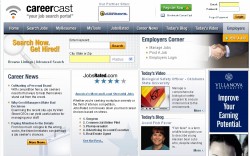Here’s a quick quiz from Adicio, the California company that runs the CareerCast jobs network:
- What’s the most stressful job? Now the second most stressful? And the 3rd?
- How about the best job in the U.S. to have? 2nd best?
- What’s the worst?
 Some of the answers in the Jobs Rated Report issued by Adicio will surprise you. In the stress area, Adicio rated surgeon and airline pilot as first and second most stressful jobs respectively. Considering that one has a job where a little uh-oh can be a life or death matter and the other never knows when a routine day at the office might turn into a landing in the Hudson, I can buy the stress rating. But photojournalist as the third most stressful job? Well, hmmm.
Some of the answers in the Jobs Rated Report issued by Adicio will surprise you. In the stress area, Adicio rated surgeon and airline pilot as first and second most stressful jobs respectively. Considering that one has a job where a little uh-oh can be a life or death matter and the other never knows when a routine day at the office might turn into a landing in the Hudson, I can buy the stress rating. But photojournalist as the third most stressful job? Well, hmmm.
The best job? That would be mathematician, says the report, with actuary and statistician filling out the top three places. That rating had me flashing on the Monster commercial from 1999. The black and white one with the kids saying things like, “When I grow up I want to file all day.”
I don’t know about you, but I have never, ever heard anyone tell me they wanted to be an actuary when they grow up. Pilot, yes. Doctor, of course. Even photojournalist.
When I lived near the mountains I knew a lumberjack who loved his job and worked at it every summer when he was off from his winter job as a teacher. Bad career choice for him since lumberjack is rated as the worst job in the United States, because, says Adicio, “lumberjacks perform backbreaking physical labor in an unpleasant environment.” It was the physical labor that appealed to my acquaintance. And, whatever you may think of cutting down trees in a forest, it is a forest. What’s not to like?
For some truly nasty jobs check out Discovery’s Mike Rowe. With remarkable weekly tenacity he tackles jobs like diaper cleaner, animal rendering worker, and worse. Lumberjack looks better by the minute.
Adicio, however, assures us that its ratings system has a methodology to it that involves assessing the 200 jobs in the survey on dozens of factors, including physical demands, job hazards, and whether you have to deal with the public. Income is but one of the five core components, so a surgeon’s $309,000 salary isn’t enough to offset the stress factors. Even though a mathematician earns less than a third of the average surgeon, they can simply erase their mistakes.
These kinds of ratings are more fun than serious science. As a quick look at the dozens of comments that have been posted to the CareerCast report pages shows, what constitutes the “best” job is entirely in the eye of the holder. As one of the posters notes,
“It’s true — being a statistician is a great job. I’m so glad to see it in this list. I think it should be higher than mathematician though, since it has broader application areas.”
Yet another, looking at the same list, says,
“I would love to know why there is not one creative job on there. Those jobs above would make me poke out my own eyes.”
Poster Chinook sums it up nicely,
“A fisherman or a logger, just because they have, according to this list, a bad job, doesn’t mean it is a bad job. In fact, most fishermen and loggers enjoy their jobs immensely, and wouldn’t trade it for the world. Conversely, just because you have a high-ranked job here, doesn’t mean you enjoy it. One could downright hate said jobs. I could never be any of the first 20. My ideal job list is completely in the back one hundred of the list.”
 As much fun as the jobs-rated report is, it does offer hints about Adicio’s coming out. The software technology company that for years specialized in providing classifieds platforms for the newspaper industry launched CareerCast.com a few weeks ago. It rounds up the job listings from Adicio’s publishing and niche partners into a single portal that is replete with career information, news, blogs and resources.
As much fun as the jobs-rated report is, it does offer hints about Adicio’s coming out. The software technology company that for years specialized in providing classifieds platforms for the newspaper industry launched CareerCast.com a few weeks ago. It rounds up the job listings from Adicio’s publishing and niche partners into a single portal that is replete with career information, news, blogs and resources.
The portal represents a departure from Adicio’s long-held insistence that it wasn’t in the publishing business. For years it enabled its partners to form alliances on any basis they wished and upsell listings. They could also upsell local listings to a national network, which job seekers accessed through their local site. However, Adicio resisted creating a single national destination.
CareerCast.com as a national jobs portal makes a lot of sense. It’s easier to market a single destination; search engines can find things more efficiently; and job seekers expect it. Not having a single destination site for all those jobs was probably a concession to the thinking of its newspaper clients who fretted about protecting their franchise. In the interim, of course, Monster, HotJobs, Beyond, and CareerBuilder (among others) have built their own networks. Meanwhile, the print side of newspapers has little left to protect.

As CareerCast now plays catchup with other jobs portals, I suspect we’ll be hearing more from Adicio in the coming months than we have in the last several years. The company’s put its chief alliance officer Tony Lee in charge of CareerCast. Certainly a smart move, considering he helmed the Wall Street Journal’s online classifieds, including CareerJournal, for many years.
Lee knows recruitment and tells us the CareerCast model changes nothing about the Adicio approach. There is no standalone national buy. The only way for an employer’s job posting to appear on CareerCast.com is for the employer to place an ad with a local or niche site. You can do it through the portal or directly through the site. (There are about 500 of them.) Prices vary widely. The New York Post gets your ad online for $150. LawJobs.com charges you $600. Targeting and audience account for most of the price differential. From the employer standpoint, CareerCast.com is an added value.
Some of these sites also participate in regional networks, to which a local listing can be upsold. All of them can upsell into the national network (which is different from CareerCast.com since the network can only be accessed from a local site.) There are also cross-posting opportunities where an ad on one site can be cross-posted to another site for an additional fee.
It has a nickling and diming feel to it, but Lee says it’s effective and efficient since employers target their jobs, reducing applicant volume by buying only some sites and increasing it by “going national” when they need to. The fuzzy part is how CareerCast.com fits, since all the jobs are aggregated at the portal.
Making this work, particularly in the face of the established networks, is going to be a challenge. Perhaps Lee’s job should have made the stress-test list.